formerly eScholarship Editions


|
|
|
|
Your request for similar items found 20 book(s). | Modify Search | Displaying 1 - 20 of 20 book(s) | |
| 1. | 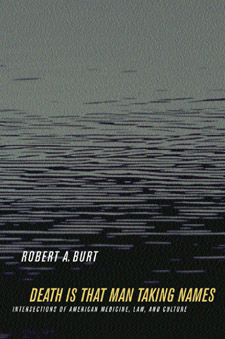 | Title: Death is that man taking names: intersections of American medicine, law, and culture Author: Burt, Robert 1939- Published: University of California Press, 2002 Subjects: Law | Health Care | History of Medicine | Ethics | Religion Publisher's Description: The American culture of death changed radically in the 1970s. For terminal illnesses, hidden decisions by physicians were rejected in favor of rational self-control by patients asserting their "right to die" - initially by refusing medical treatment and more recently by physician-assisted suicide. This new claim rested on two seemingly irrefutable propositions: first, that death can be a positive good for individuals whose suffering has become intolerable; and second, that death is an inevitable and therefore morally neutral biological event. Death Is That Man Taking Names suggests, however, that a contrary attitude persists in our culture - that death is inherently evil, not just in practical but also in moral terms. The new ethos of rational self-control cannot refute but can only unsuccessfully try to suppress this contrary attitude. The inevitable failure of this suppressive effort provokes ambivalence and clouds rational judgment in many people's minds and paradoxically leads to inflictions of terrible suffering on terminally ill people. Judicial reforms in the 1970s of abortion and capital punishment were driven by similarly high valuations of rationality and public decision-making - rejecting physician control over abortion in favor of individual self-control by pregnant women and subjecting unsupervised jury decisions for capital punishment to supposed rationally guided supervision by judges. These reforms also attempt to suppress persistently ambivalent attitudes toward death, and are therefore prone to inflicting unjustified suffering on pregnant women and death-sentenced prisoners. In this profound and subtle account of psychological and social forces underlying American cultural attitudes toward death, Robert A. Burt maintains that unacknowledged ambivalence is likely to undermine the beneficent goals of post-1970s reforms and harm the very people these changes were intended to help. [brief] Similar Items |
| 2. | 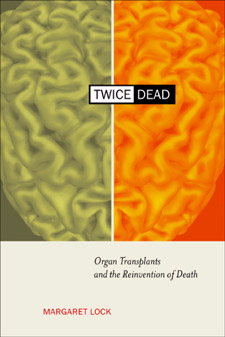 | Title: Twice dead: organ transplants and the reinvention of death Author: Lock, Margaret M Published: University of California Press, 2001 Subjects: Anthropology | Medical Anthropology | Cultural Anthropology | Ethics | Sociology | Sociology | Ethics | Sociology | Ethnic Studies | Ethnic Studies Publisher's Description: Tales about organ transplants appear in mythology and folk stories, and surface in documents from medieval times, but only during the past twenty years has medical knowledge and technology been sufficiently advanced for surgeons to perform thousands of transplants each year. In the majority of cases individuals diagnosed as "brain dead" are the source of the organs without which transplants could not take place. In this compelling and provocative examination, Margaret Lock traces the discourse over the past thirty years that contributed to the locating of a new criterion of death in the brain, and its routinization in clinical practice in North America. She compares this situation with that in Japan where, despite the availability of the necessary technology and expertise, brain death was legally recognized only in 1997, and then under limited and contested circumstances. Twice Dead explores the cultural, historical, political, and clinical reasons for the ready acceptance of the new criterion of death in North America and its rejection, until recently, in Japan, with the result that organ transplantation has been severely restricted in that country. This incisive and timely discussion demonstrates that death is not self-evident, that the space between life and death is historically and culturally constructed, fluid, multiple, and open to dispute. In addition to an analysis of that professional literature on and popular representations of the subject, Lock draws on extensive interviews conducted over ten years with physicians working in intensive care units, transplant surgeons, organ recipients, donor families, members of the general public in both Japan and North America, and political activists in Japan opposed to the recognition of brain death. By showing that death can never be understood merely as a biological event, and that cultural, medical, legal, and political dimensions are inevitably implicated in the invention of brain death, Twice Dead confronts one of the most troubling questions of our era. [brief] Similar Items |
| 3. | 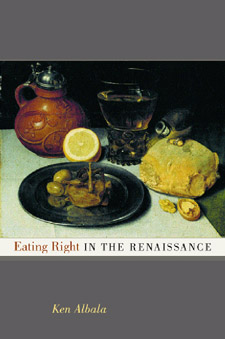 | Title: Eating right in the Renaissance Author: Albala, Ken 1964- Published: University of California Press, 2002 Subjects: Food and Cooking | Renaissance History | History of Science | History of Food Publisher's Description: Eating right has been an obsession for longer than we think. Renaissance Europe had its own flourishing tradition of dietary advice. Then, as now, an industry of experts churned out diet books for an eager and concerned public. Providing a cornucopia of information on food and an intriguing account of the differences between the nutritional logic of the past and our own time, this inviting book examines the wide-ranging dietary literature of the Renaissance. Ken Albala ultimately reveals the working of the Renaissance mind from a unique perspective: we come to understand a people through their ideas on food. Eating Right in the Renaissance takes us through an array of historical sources in a narrative that is witty and spiced with fascinating details. Why did early Renaissance writers recommend the herbs parsley, arugula, anise, and mint to fortify sexual prowess? Why was there such a strong outcry against melons and cucumbers, even though people continued to eat them in large quantities? Why was wine considered a necessary nutrient? As he explores these and other questions, Albala explains the history behind Renaissance dietary theories; the connections among food, exercise, and sex; the changing relationship between medicine and cuisine; and much more. Whereas modern nutritionists may promise a slimmer waistline, more stamina, or freedom from disease, Renaissance food writers had entirely different ideas about the value of eating right. As he uncovers these ideas from the past, Ken Albala puts our own dietary obsessions in an entirely new light in this elegantly written and often surprising new chapter on the history of food. [brief] Similar Items |
| 4. | 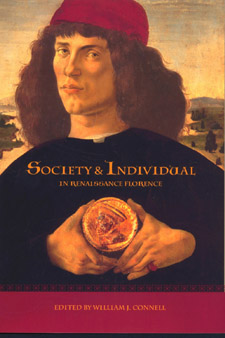 | Title: Society and individual in Renaissance Florence Author: Connell, William J Published: University of California Press, 2002 Subjects: History | Renaissance History | European History Publisher's Description: Renaissance Florence has often been described as the birthplace of modern individualism, as reflected in the individual genius of its great artists, scholars, and statesmen. The historical research of recent decades has instead shown that Florentines during the Renaissance remained enmeshed in relationships of family, neighborhood, guild, patronage, and religion that, from a twenty-first-century perspective, greatly limited the scope of individual thought and action. The sixteen essays in this volume expand the groundbreaking work of Gene Brucker, the historian in recent decades who has been most responsible for the discovery and exploration of these pre-modern qualities of the Florentine Renaissance. Exploring new approaches to the social world of Florentines during this fascinating era, the essays are arranged in three groups. The first deals with the exceptionally resilient and homogenous Florentine merchant elite, the true protagonist of much of Florentine history. The second considers Florentine religion and Florence's turbulent relations with the Church. The last group of essays looks at criminals, expatriates, and other outsiders to Florentine society. [brief] Similar Items |
| 5. | 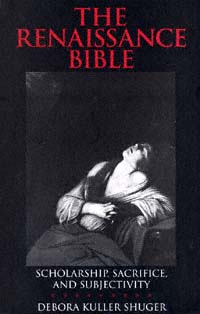 | Title: The Renaissance Bible: scholarship, sacrifice, and subjectivity Author: Shuger, Debora K 1953- Published: University of California Press, 1994 Subjects: Literature | Religion | Literary Theory and Criticism | Renaissance History | Christianity | Renaissance Literature Publisher's Description: This is the first book on the Renaissance Bible by an Anglo-American scholar in nearly fifty years. Not confined to a history of exegesis, it is instead a study of Renaissance culture - a culture whose central text was the Bible. Shuger explores, among other topics, the links between late medieval Christology and early modern subjectivity; religious eroticism and the origins of the sexualized body; the transformation of humanist philology into comparative religion; and the representation of daughter-sacrifice and female erotic desire. [brief] Similar Items |
| 6. | 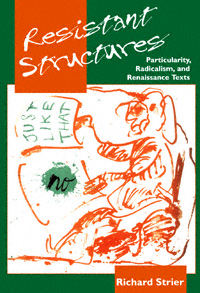 | Title: Resistant structures: particularity, radicalism, and Renaissance texts Author: Strier, Richard Published: University of California Press, 1997 Subjects: Literature | Literary Theory and Criticism | Renaissance Literature | English Literature Publisher's Description: Taking Wittgenstein's "Don't think, but look" as his motto, Richard Strier argues against the application of a priori schemes to Renaissance (and all) texts. He argues for the possibility and desirability of rigorously attentive but "pre-theoretical" reading. His approach privileges particularity and attempts to respect the "resistant structures" of texts. He opposes theories, critical and historical, that dictate in advance what texts must - or cannot - say or do.The first part of the book, "Against Schemes," demonstrates, in discussions of Rosemond Tuve, Stephen Greenblatt, and Stanley Fish among others, how both historicist and purely theoretical approaches can equally produce distortion of particulars. The second part, "Against Received Ideas," shows how a variety of texts (by Shakespeare, Donne, Herbert, and others) have been seen through the lenses of fixed, mainly conservative ideas in ways that have obscured their actual, surprising, and sometimes surprisingly radical content. [brief] Similar Items |
| 7. | 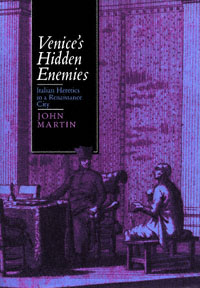 | Title: Venice's hidden enemies: Italian heretics in a Renaissance city Author: Martin, John Jeffries Published: University of California Press, 1993 Subjects: History | European History | Christianity | Renaissance History Publisher's Description: How could early modern Venice, a city renowned for its political freedom and social harmony, also have become a center of religious dissent and inquisitorial repression? To answer this question, John Martin develops an innovative approach that deftly connects social and cultural history. The result is a profoundly important contribution to Renaissance and Reformation studies.Martin offers a vivid re-creation of the social and cultural worlds of the Venetian heretics - those men and women who articulated their hopes for religious and political reform and whose ideologies ranged from evangelical to anabaptist and even millenarian positions. In exploring the connections between religious beliefs and social experience, he weaves a rich tapestry of Renaissance urban life that is sure to intrigue all those involved in anthropological, religious, and historical studies - students and scholars alike. [brief] Similar Items |
| 8. |  | Title: Trials of authorship: anterior forms and poetic reconstruction from Wyatt to Shakespeare Author: Crewe, Jonathan V Published: University of California Press, 1990 Subjects: Literature | Renaissance Literature | English Literature Publisher's Description: For more than a decade, the English Renaissance has been the scene of trial for the critical methodologies of deconstruction, feminism, new historicism, psychoanalytic poststructuralism, and cultural studies. Jonathan Crewe argues that the commitment in the prevailing criticism to innovation, transgression, and radical change has increasingly obscured some powerfully conservative elements both in Renaissance culture and in these critical discourses themselves.In a reading of the poets Wyatt, Surrey, and Gascoigne, and of the biographies of Thomas More and Cardinal Wolsey, Crewe focuses on the relatively stable poetic and cultural forms operative in the Renaissance. He argues that these established forms, which shape poetic composition, social interaction, and individual identity, are subject to only limited reconstruction by English authors in the sixteenth century. They both facilitate and limit literary and social expression and result in more sharply conflicted literary production than contemporary critics have been willing to acknowledge. Crewe concentrates on authors whose canonical status is somewhat precarious and intentionally shifts the emphasis away from the Elizabethan period and toward that of Henry VIII. Trials of Authorship redraws the existing picture of the English Renaissance in the sixteenth century. [brief] Similar Items |
| 9. | 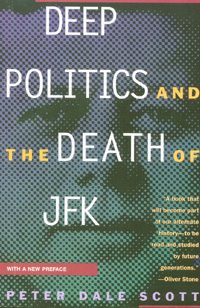 | Title: Deep politics and the death of JFK Author: Scott, Peter Dale Published: University of California Press, 1993 Subjects: History | Politics | Popular Culture | United States History | American Studies | Sociology Publisher's Description: Peter Dale Scott's meticulously documented investigation uncovers the secrets surrounding John F. Kennedy's assassination. Offering a wholly new perspective - that JFK's death was not just an isolated case, but rather a symptom of hidden processes - Scott examines the deep politics of early 1960s American international and domestic policies.Scott offers a disturbing analysis of the events surrounding Kennedy's death, and of the "structural defects" within the American government that allowed such a crime to occur and to go unpunished. In nuanced readings of both previously examined and newly available materials, he finds ample reason to doubt the prevailing interpretations of the assassination. He questions the lone assassin theory and the investigations undertaken by the House Committee on Assassinations, and unearths new connections between Oswald, Ruby, and corporate and law enforcement forces.Revisiting the controversy popularized in Oliver Stone's movie JFK, Scott probes the link between Kennedy's assassination and the escalation of the U.S. commitment in Vietnam that followed two days later. He contends that Kennedy's plans to withdraw troops from Vietnam - offensive to a powerful anti-Kennedy military and political coalition - were secretly annulled when Johnson came to power. The split between JFK and his Joint Chiefs of Staff, and the collaboration between Army Intelligence and the Dallas Police in 1963, are two of the several missing pieces Scott adds to the puzzle of who killed Kennedy and why.Scott presses for a new investigation of the Kennedy assassination, not as an external conspiracy but as a power shift within the subterranean world of American politics. Deep Politics and the Death of JFK shatters our notions of one of the central events of the twentieth century. [brief] Similar Items |
| 10. | 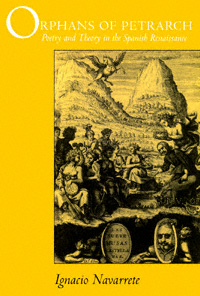 | Title: Orphans of Petrarch: poetry and theory in the Spanish Renaissance Author: Navarrete, Ignacio Enrique 1954- Published: University of California Press, 1994 Subjects: Literature | Literary Theory and Criticism | Poetry | Renaissance Literature Publisher's Description: In Spain as elsewhere, Renaissance poets transformed the lyric tradition by using Petrarch as a source of poetic renewal. But political unity and military hegemony, coupled with a sense of cultural inferiority and an obsession with ethnic purity, made Spain different. Drawing on modern critical theory, Ignacio Navarrete offers a new exposition of the development of Spanish Renaissance poetics. Grounded in both philology and cultural theory, Orphans of Petrarch is the first book to integrate the "Spanish difference" into an understanding of Renaissance lyric as a European phenomenon. [brief] Similar Items |
| 11. |  | Title: Jewish life in renaissance Italy Author: Bonfil, Roberto Published: University of California Press, 1994 Subjects: Jewish Studies | Renaissance History | European History Publisher's Description: With this heady exploration of time and space, rumors and silence, colors, tastes, and ideas, Robert Bonfil recreates the richness of Jewish life in Renaissance Italy. He also forces us to rethink conventional interpretations of the period, which feature terms like "assimilation" and "acculturation." Questioning the Italians' presumed capacity for tolerance and civility, he points out that Jews were frequently uprooted and persecuted, and where stable communities did grow up, it was because the hostility of the Christian population had somehow been overcome.After the ghetto was imposed in Venice, Rome, and other Italian cities, Jewish settlement became more concentrated. Bonfil claims that the ghetto experience did more to intensify Jewish self-perception in early modern Europe than the supposed acculturation of the Renaissance. He shows how, paradoxically, ghetto living opened and transformed Jewish culture, hastening secularization and modernization.Bonfil's detailed picture reveals in the Italian Jews a sensitivity and self-awareness that took into account every aspect of the larger society. His inside view of a culture flourishing under stress enables us to understand how identity is perceived through constant interplay - on whatever terms - with the Other. [brief] Similar Items |
| 12. | 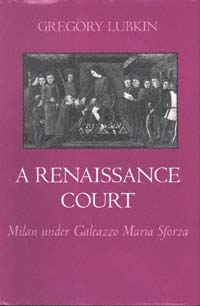 | Title: A Renaissance court: Milan under Galeazzo Maria Sforza Author: Lubkin, Gregory Published: University of California Press, 1994 Subjects: History | Renaissance History Publisher's Description: Ambitious, extravagant, progressive, and sexually notorious, Galeazzo Maria Sforza inherited the ducal throne of Milan in 1466, at the age of twenty-two. Although his reign ended tragically only ten years later, the young prince's court was a dynamic community where arts, policy making, and the panoply of state were integrated with the rhythms and preoccupations of daily life. Gregory Lubkin explores this vital but overlooked center of power, allowing the members of the Milanese court to speak for themselves and showing how dramatically Milan and its ruler exemplified the political, cultural, religious, and economic aspirations of Renaissance Italy. [brief] Similar Items |
| 13. | 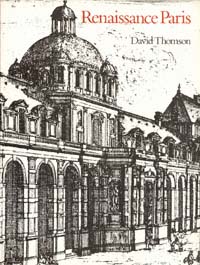 | Title: Renaissance Paris: architecture and growth, 1475-1600 Author: Thomson, David 1912- Published: University of California Press, 1985 Subjects: Art | Architecture Publisher's Description: In the modern literature on Renaissance art and architecture, Paris has often been considered the Cinderella of the European capitals. The prestigious buildings that were erected soon after François I decided in 1528 to make Paris his residence have long since been lost. Thomson, however, restores t . . . [more] Similar Items |
| 14. | 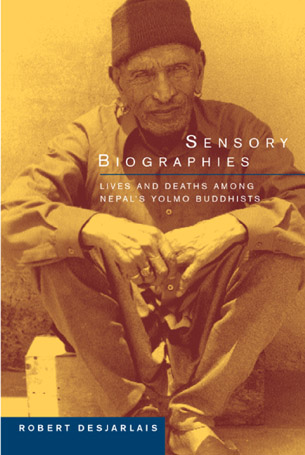 | Title: Sensory biographies: lives and deaths among Nepal's Yolmo Buddhists Author: Desjarlais, Robert R Published: University of California Press, 2003 Subjects: Anthropology | Cultural Anthropology | Buddhism | Aging Publisher's Description: Robert Desjarlais's graceful ethnography explores the life histories of two Yolmo elders, focusing on how particular sensory orientations and modalities have contributed to the making and the telling of their lives. These two are a woman in her late eighties known as Kisang Omu and a Buddhist priest in his mid-eighties known as Ghang Lama, members of an ethnically Tibetan Buddhist people whose ancestors have lived for three centuries or so along the upper ridges of the Yolmo Valley in north central Nepal. It was clear through their many conversations that both individuals perceived themselves as nearing death, and both were quite willing to share their thoughts about death and dying. The difference between the two was remarkable, however, in that Ghang Lama's life had been dominated by motifs of vision, whereas Kisang Omu's accounts of her life largely involved a "theatre of voices." Desjarlais offers a fresh and readable inquiry into how people's ways of sensing the world contribute to how they live and how they recollect their lives. [brief] Similar Items |
| 15. | 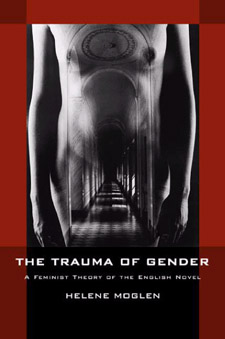 | Title: The trauma of gender: a feminist theory of the English novel Author: Moglen, Helene 1936- Published: University of California Press, 2001 Subjects: Literature | Gender Studies | Women's Studies | European Studies | European History | Literary Theory and Criticism | English Literature Publisher's Description: Helene Moglen offers a revisionary feminist argument about the origins, cultural function, and formal structure of the English novel. While most critics and historians have associated the novel's emergence and development with the burgeoning of capitalism and the rise of the middle classes, Moglen contends that the novel princi- pally came into being in order to manage the social and psychological strains of the modern sex-gender system. Rejecting the familiar claim that realism represents the novel's dominant tradition, she shows that, from its inception in the eighteenth century, the English novel has contained both realistic and fantastic narratives, which compete for primacy within individual texts. [brief] Similar Items |
| 16. | 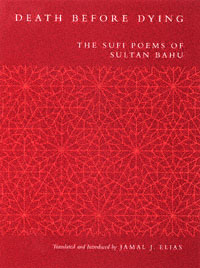 | Title: Death before dying: the Sufi poems of Sultan Bahu Author: Sult̤ān Bāhū 1630-1691 Published: University of California Press, 1998 Subjects: Literature | Religion | Poetry | Middle Eastern Studies | Literature in Translation | Islam | South Asia Publisher's Description: These 115 poems introduce readers in English to Sultan Bahu (d. 1691), a Sufi mystical poet who continues to be one of the most beloved writers in Punjabi. Bahu, whose name translates as "With God," remains highly popular in Pakistan and India today - even illiterate Punjabis can recite his poetry b . . . [more] Similar Items |
| 17. | 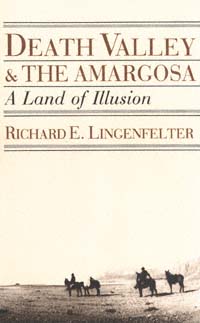 | Title: Death Valley & the Amargosa: a land of illusion Author: Lingenfelter, Richard E Published: University of California Press, 1988 Subjects: History | California and the West | United States History Similar Items |
| 18. | 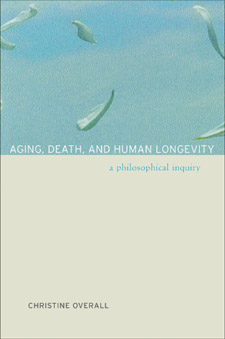 | Title: Aging, death, and human longevity: a philosophical inquiry Author: Overall, Christine 1949- Published: University of California Press, 2003 Subjects: Philosophy | Ethics | Public Policy Publisher's Description: With the help of medicine and technology we are living longer than ever before. As human life spans have increased, the moral and political issues surrounding longevity have become more complex. Should we desire to live as long as possible? What are the social ramifications of longer lives? How does a longer life span change the way we think about the value of our lives and about death and dying? Christine Overall offers a clear and intelligent discussion of the philosophical and cultural issues surrounding this difficult and often emotionally charged issue. Her book is unique in its comprehensive presentation and evaluation of the arguments - both ancient and contemporary - for and against prolonging life. It also proposes a progressive social policy for responding to dramatic increases in life expectancy. Writing from a feminist perspective, Overall highlights the ways that our biases about race, class, and gender have affected our views of elderly people and longevity, and her policy recommendations represent an effort to overcome these biases. She also covers the arguments surrounding the question of the "duty to die" and includes a provocative discussion of immortality. After judiciously weighing the benefits and the risks of prolonging human life, Overall persuasively concludes that the length of life does matter and that its duration can make a difference to the quality and value of our lives. Her book will be an essential guide as we consider our social responsibilities, the meaning of human life, and the prospects of living longer. [brief] Similar Items |
| 19. | 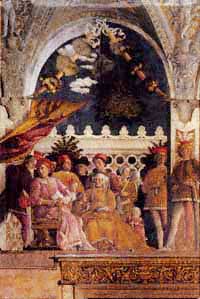 | Title: Knights at court: courtliness, chivalry, & courtesy from Ottonian Germany to the Italian Renaissance Author: Scaglione, Aldo D Published: University of California Press, 1992 Subjects: Literature | European Literature | Medieval Studies | Renaissance Literature Publisher's Description: Knights at Court is a grand tour and survey of manners, manhood, and court life in the Middle Ages, like no other in print. Composed on an epic canvas, this authoritative work traces the development of court culture and its various manifestations from the latter years of the Holy Roman Empire (ca. A.D. 1000) to the Italian Renaissance of the fifteenth and sixteenth centuries.Leading medievalist and Renaissance scholar Aldo Scaglione offers a sweeping sociological view of three geographic areas that reveals a surprising continuity of courtly forms and motifs: German romances; the lyrical and narrative literature of northern and southern France; Italy's chivalric poetry. Scaglione discusses a broad number of texts, from early Norman and Flemish baronial chronicles to the romances of Chrétien de Troyes, the troubadours and Minnesingers. He delves into the Niebelungenlied, Dante, Petrarch, Boccaccio, and an array of treatises on conduct down to Castiglione and his successors.All these works and Scaglione's superior scholarship attest to the enduring power over minds and hearts of a mentality that issued from a small minority of people - the courtiers and knights - in central positions of leadership and power. Knights at Court is for all scholars and students interested in "the civilizing process." [brief] Similar Items |
| 20. | 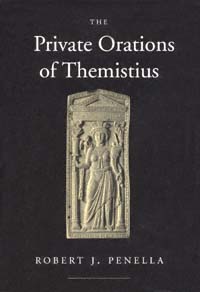 | Title: The private orations of Themistius Author: Themistius Published: University of California Press, 1999 Subjects: Classics | Classical Literature and Language | Classical History | Classical Politics | Classical Religions | Ancient History Publisher's Description: Themistius was a philosopher, a prominent Constantinopolitan senator, and an adviser to Roman emperors during the fourth century A.D. In this first translation of Themistius's private orations to be published in English, Robert J. Penella makes accessible texts that shed significant light on the culture of Constantinople and, more generally, the eastern Roman empire during the fourth century. The sixteen speeches translated here are equipped with ample annotations and an informative introduction, making them a valuable resource on the late antique period, as well as on Greek intellectual history and oratory.In Themistius's public orations, he played the role of imperial panegyrist, but in the "private" or unofficial orations presented here, the senator concerns himself with apologetics, rhetorical and philosophical programs, material of autobiographical interest, and ethical themes. The speeches are valuable as evidence for the political, social, philosophical, religious, and literary history of fourth century Byzantium, and as examples of pagan ideology and eloquence in the newly Christianized court. Themistius argues, among other things, that the philosopher should be involved in public affairs, that the lessons of philosophy should be broadcast to the masses, and that it is appropriate for the philosopher to be an effective orator in order to circulate his teachings. [brief] Similar Items |